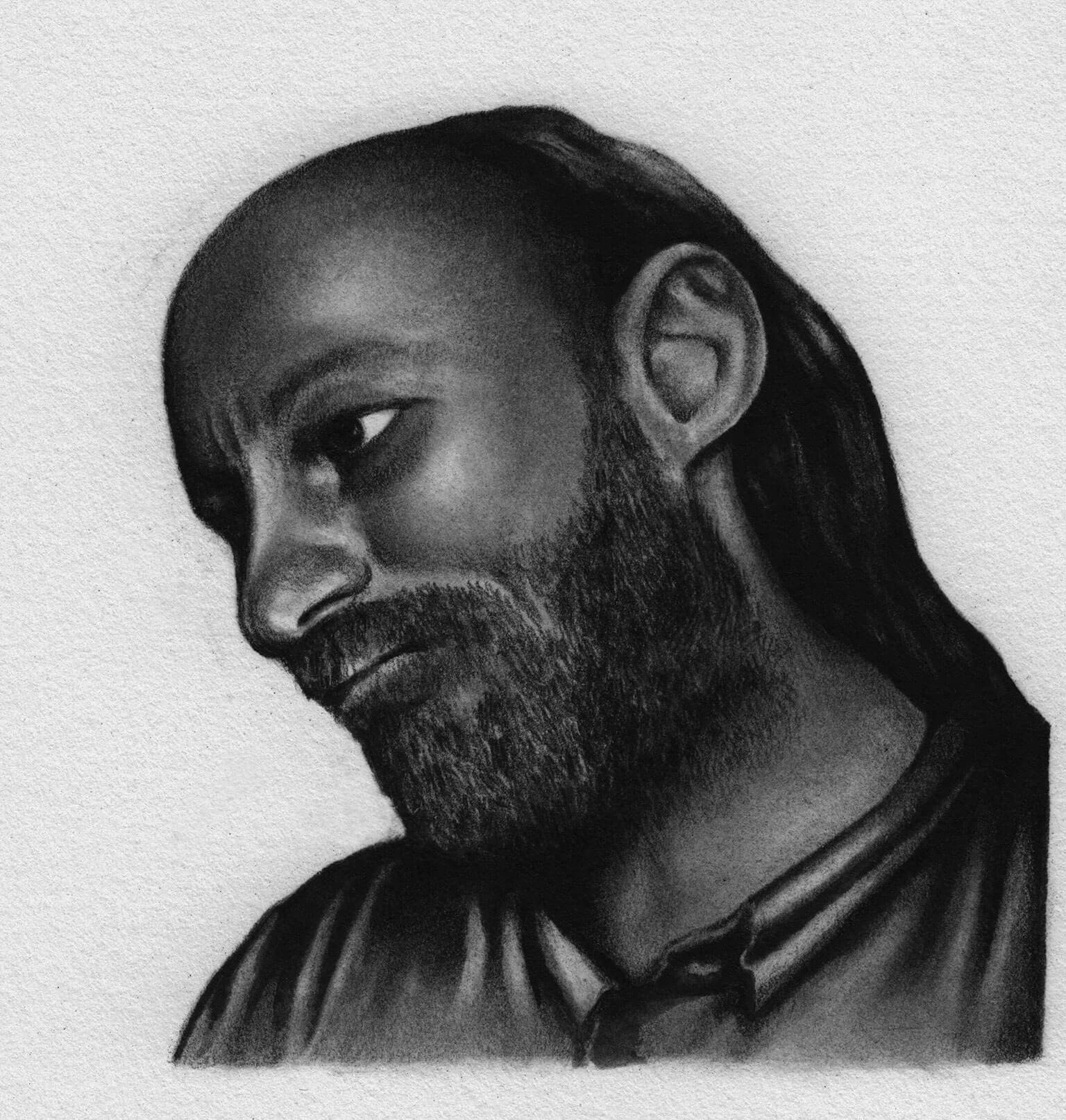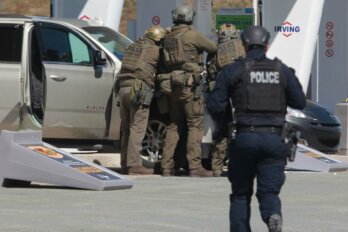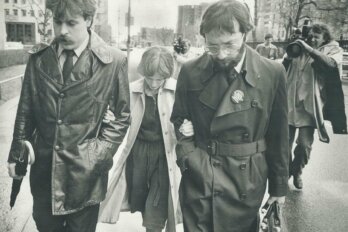In her new book, That Lonely Section of Hell, former Vancouver police detective Lori Shenher describes her investigations of missing women from the Downtown Eastside, which culminated in the eventual arrest, prosecution, and conviction of serial killer Robert Pickton. In this adaptation, she provides an eyewitness account of his first interrogation.
On February 22, 2002, Robert Pickton slept on a cold mattress in a Surrey, British Columbia, jail. His cellmate was an undercover RCMP officer. When I arrived at the detachment early that morning, I sat down in a video room, where I watched a monitor showing Pickton asleep in the cell. He had masturbated almost immediately upon arriving the previous day and, to the horror of his poor cellmate, would do so again several times throughout the night.
Eventually, the members of the RCMP forensic interview team appeared. These were the best and brightest interviewers in the province, and they were not accustomed to failure: the goal was a confession. I was joined by Vancouver Police Department homicide detective Phil Little and RCMP sergeant Randy Hundt, a forensics expert. We were taken to a larger meeting room outfitted with a large projection screen so that we could watch the interview from there. Throughout the day, several high-ranking RCMP members would come and go, but the three of us remained.
Sergeant Bill Fordy was first in the room, and he spoke to the monitor before Pickton came in. He had the most difficult job: to lay out the groundwork of the investigation so that the accused could understand the case against him. The first interviewer is much like a starting pitcher in baseball: the confession isn’t typically given to the starter; it’s the closer who hears it. As the first interviewer, you are in a thankless, often frustrating position. Not until the person confesses do you see that you’ve done your job.
Fordy apologized for the way he might speak about the women, suggesting that this would be a tactic, one that in no way represented his own feelings or judgments about the victims. I found this to be a sensitive and compassionate preamble, which would help put family members and loved ones at ease when the time came for the tape to be viewed in court. It moved me unexpectedly, and I had to fight to hide my emotions from the others in the room.
I made no notes during the interview. I would have had to provide them to the court, and that was not my function. My description of this interview is, therefore, based on my recollection of what was said and the spirit in which it was said. When I paraphrase, it is in my language, not Pickton’s. Indeed, his language was at times incomprehensible and so lacking in focus that it was impossible to decipher fully.
Fordy brought Pickton into the interview room just after 10 a.m., and the two sat down. The room was furnished with a few upholstered chairs, a video monitor and VCR, a table, and an easel. Pickton looked haggard, his hair unkempt and scraggly, and he had several days’ growth of beard. Fordy explained the two murder charges and reiterated Pickton’s right to speak to counsel, confirming that the accused had spoken to a lawyer that morning. Pickton looked at the floor. His answers often were incoherent mumblings.
The sergeant assured Pickton that he would treat him with dignity and respect, and added that he expected the same in return. The two shook hands on this, and Pickton appeared taken aback by Fordy’s earnest attempt to treat him as a person. It seemed to throw off his plan to appear uninterested.
It also seemed that Pickton was only half-listening; he would grunt or chuckle slightly when Fordy told him that he was being investigated in the disappearances of dozens of women and had so far been charged with the murders of two. He made some half-hearted assertions that he wasn’t guilty but rather was the victim of some sort of conspiracy.
As is often done in the rapport-building phase of an interview, Fordy spoke about himself in an effort to bond with Pickton. The goal is to allow the accused to see the interviewer as a human being, not merely an authority figure. Throughout this phase, Pickton appeared to be almost mentally deficient, referring to himself variously as “just a pig man” and a simple, hard-working guy. He sat hunched over in his chair, turned slightly away from the table holding the TV monitor, his feet tucked up underneath his legs.
Eventually, the conversation turned to Pickton’s mother, who died of cancer in 1979. Pickton quoted the exact date. He told Fordy how close they had been, how he had gotten his work ethic from his mother, what a strong person she had been, and how he had always tried to emulate her strength and to work as hard as she had done. He said he respected her strong mind and her willpower. Fordy went on to talk about the best thing that had happened in his life—having children—and asked Pickton to tell him what the best thing in his life was. Pickton said it was hard work; work was the best thing in his life.
After further reflection, Pickton offered that he went on a holiday once. I expected to hear him tell of some trip to Hawaii or Mexico to lie in the sun. But he said he went to Kansas City, Missouri, in 1974—his one holiday away from Port Coquitlam and the farm that both sustained and trapped him. He was twenty-four then and had money in his pocket and friends to visit. Within a week of being there, he met a woman named Connie, and they fell in love.
They became engaged and spent the next five weeks together, hanging out, travelling around the area, and meeting people. He spoke with disdain of free cherry pie being given away in the streets, as though the wasteful gesture was offensive to him. He said several times he figured Connie was probably married with kids by now. It was an odd thing to say—as if he still thought about her often and wondered whether she would be available. He told her he had to return to the farm. She had a job she couldn’t leave, in Pontiac, Michigan, so they went their separate ways. His resentment toward the farm was obvious. He continued to speak in his mumbling, rambling manner.
Pickton told a story about getting injured while trying to break up a fight between two boars on his farm. He dragged himself to the hospital for treatment, but the staff couldn’t do anything for him other than wrap up his wounds. He was told to rest, but it was the height of summer and there was much work to be done. He described how he climbed up on his tractor in the midday heat and worked, pus streaming down his injured leg, heat blisters forming and breaking on his back. He told Fordy he stayed on that tractor and worked, despite his pain, despite the heat, and it was clear he took a great deal of pride in this.
He told another story about being injured by the hogs on the farm when he was younger. From these two stories, it seemed there arose a respect bordering on hatred for these beasts. My sense was that these events galvanized him. He made a decision never to be conquered by the animals again and turned himself into a human slaughtering machine, gaining local fame by killing up to 150 pigs a week. He had been close to other animals—a calf he raised as a boy and a horse he would later have to put down because of injury—but they had disappointed him, causing him a great deal of sadness. It seemed he decided not to go through the pain of losing a loved one again.
The story of his horse was bizarre. Fordy asked him about it because the head of a horse was mounted on a wall of the trailer on Pickton’s property. Again, Pickton quoted the dates and times of the horse’s birth and death as though they’d happened the day before, even though both events had taken place more than twenty years prior. His command of dates was almost savant-like, and I suspected that if he had killed the women, he could probably recite every detail surrounding the events. I wasn’t at all certain I was prepared to hear that.
He had to put the horse down because another horse kicked it in the leg, and the damage was irreparable. He killed it, then loaded it into his truck to take to a taxidermist for mounting, but there was some problem with the truck, and he ended up hauling the head—blood leaking from the burlap sack he carried it in—onto a city bus. The people on the bus stared, but no one spoke to Pickton; he just sat there, stunned in his grief. Thinking back, he said, they must have thought he was crazy.
He also told a story about the calf he raised, which was another important part of his life. Pickton wasn’t more than ten and played with the calf like a pet. He came home from school one day and couldn’t see the animal anywhere in the yard, so he set out to find it. Because he had trained the calf to stay away from the barn, where the slaughtering was done, he didn’t think to look there. Finally, after exhausting all other options, he went to the barn and found his calf—his special friend—hanging upside down, butchered. He was devastated, though he tried to downplay the event’s effect on him in front of Fordy. He said he had never spent time in the barn before that incident. He didn’t like the killing.
Fordy left the room for a moment. He returned with a large poster board displaying photos of the forty-eight missing women and set it off to the side. I couldn’t see whether their names were beneath their photos, nor could I make out the women’s identities. But the board was a looming and ominous presence in the room, and I knew it bore many of those same images that I had stared at for long hours in our project room. Pickton would not look directly at it until Fordy began to point to various photos and ask questions about the women.
Fordy asked Pickton to tell him which of the women had been out to his farm. He began with number one, and Pickton said she had been out to the farm “lots.” He said he didn’t know the women in some of the photos. Some of them, he said, were pretty. He exclaimed, “Who the hell is she? ” to one of the pictures, and it came out sounding phony and rehearsed. This was the first indication I saw that perhaps the simple pig farmer persona really was an act.
At this point in the interview, Dana Lillies—a female RCMP constable who had talked to Pickton before his arrest—arrived with lunch. Fordy left, and Lillies offered to keep Pickton company. He seemed pleased to see her, and she acted as if she were genuinely concerned for his well-being. As they talked, we saw another, very different side of Pickton. He was quiet and non-confrontational, and said several times that he didn’t deserve to live, didn’t deserve Lillies’s kindness, didn’t deserve to eat, and should be on death row. It was like watching a child try to elicit sympathy from his mother by saying demeaning things about himself.
Lillies played the role well and managed to portray a level of caring I know she did not truly feel. She told Pickton that she had seen a side of him others hadn’t, that she cared about him as a human being. He lapped it up. It was obvious he wanted nothing more than to believe that this professional, attractive, bright woman could actually be interested in him.
He repeatedly told Lillies that he was finished, that his life was over, that he was “nailed to the cross.” She made some bold attempts to get him talking, asking questions about a dildo that was found on the end of a handgun, and wondering aloud how Pickton’s and Mona Wilson’s DNA could both have been found on that dildo. He said he sometimes used the dildo as a silencer for the gun because of the new subdivision beside his property. She said that didn’t explain how the DNA ended up there, and he didn’t respond.
One of the few darkly amusing moments I experienced when working on the case occurred as I listened to the wire room monitors tell everyone in the morning meeting about how Pickton likened his own notoriety to that of “Bill Laden”—by which he meant Osama bin Laden. It was clear that Pickton merely pretended to hate the publicity; he obviously relished the attention his case was generating in the international media. He was getting off on the spotlight.
Fordy seized on this and began to tell him how truly large the case was, that Pickton was bigger than the Pope, Princess Di, and bin Laden. He said Pickton was on the front page of the paper that morning, and the suspect seemed to fixate on this. Several times in the interview, just as it seemed Fordy was getting into some very deep emotional territory, Pickton would look up and say, “Am I really in the paper? ” or “Today’s paper? Really? ” or “Front page, huh? ” It must have been frustrating for Fordy, but his hard work would bear fruit later on.

Clearly, Pickton had some type of mental illness. He was not entirely devoid of emotion, but he’d gone off the rails emotionally a long time ago. When Staff Sergeant Don Adam, the case’s lead investigator, stepped into the interview room and took over the interrogation, he began to play to Pickton’s ego—which was, as we would soon discover, exactly what was needed to bring the murderer out.
He talked about Gary Ridgway, the Green River Killer, and told Pickton he didn’t know which of the two of them was the bigger murderer. Pickton laughed at this, clearly enjoying Adam’s acknowledgment of his abilities. Adam asked Pickton how many he had killed, if he knew the number. Pickton said he didn’t know. Adam asked if the police should keep looking for other killers or if it had all been him, and Pickton nodded, then said he shouldn’t say anything more without his lawyer present.
Adam began to thank Pickton for some of the good things he’d done, such as not killing children and letting many of the women who had visited his farm return to the Downtown Eastside after their dates. There was a tone of admiration in Adam’s voice, and Pickton revelled in it. Adam spoke of the people who had told investigators how Pickton could slaughter pigs all day long, longer than any other man in the area. He told Pickton he thought there was a part of him that liked killing and that, because he felt trapped by the farm, anger and sex had become mixed up with killing and disease, and the whole thing had caused him to slip, to cross that line between slaughtering pigs and killing women.
Adam sensed that Pickton was closer to a confession than at any other time in the interrogation, and he began giving him alternatives—two reasons for committing the heinous acts. One reason would be particularly distasteful; the other would be less so and, therefore, more palatable. Of course, agreeing to either alternative would be an admission of guilt. A truly innocent person would vigorously deny them both.
He began peppering Pickton with the alternatives. Did the killings start by accident or were they planned? I don’t know. Do you really not know or do you just not want to say? I don’t know. Did you catch some of the first ones stealing? Was that it, or was it purely rage and anger? I don’t know. Did it start out hard and get easier for you? Did you feel bad afterwards? I don’t know.
Pickton’s I don’t knows were barely audible, and he looked down at the floor as he spoke. Were you angry that one of the women had infected your body, given you hep C? You felt anger, didn’t you? Pickton nodded silently. How come you spared some of them? They were nice people. Was anger all it was? I shouldn’t be talking to you. It doesn’t matter what I say. It’s all over for me anyway.
Little, Hundt, and I stood stunned, two feet from the huge video monitor, mouths agape. We had each witnessed dozens of interrogations, and this was textbook: rarely do killers sit there and say, This is what I did, and this is how I did it. They are prompted and encouraged to let little bits of the truth sneak out through nods and uh-huhs, but that requires a great deal of trust and a feeling of safety with their interviewers. Often the crimes they are admitting to are horrific, and they know the world will view them as monsters. This will be the safest place they encounter for the rest of their lives, and they know it.
Pickton had swung one leg up on the table beside him, assuming an open and almost defiant posture—proud, cocksure, arrogant. And then he played his hand, asking Adam whether he would take down the fences that had been erected on the property—presumably so that his brother, David, could access the machinery and continue working—if he told him what he wanted to hear. He wanted to deal. His confession in exchange for his family getting its livelihood back. Adam said no—no deals. Pickton told him to take his offer to the higher-ups. Adam said he was as high as it got, and the answer was no—no deals. If Adam had made a deal, everything in the statement to that point would have been inadmissible, and he wasn’t prepared to take that chance when he hadn’t been able to test Pickton’s truthfulness. Adam wanted Pickton to tell him something he could send investigators out to confirm, but Pickton refused, saying again that he was already nailed to the cross.
As cool and calculating as Pickton appeared, I got the impression that he wanted Adam’s people off his property more than he was letting on, and not only to save his family’s money. He asked Adam again if his people would pull out of the farm property if he revealed everything, and again the officer refused to deal. Adam asked Pickton if he had ever killed and felt regret afterwards, and Pickton asked Adam what he wanted him to say. Adam said that all he wanted was the truth.
When Adam took Pickton out of the interview to allow him to use the washroom, he walked him through the large atrium of the Surrey RCMP detachment, past the room where we were watching. We had the windows papered so that no one could see in, but the three of us peered through the cracks to watch this man, the focus of so much attention, walk by on his way to urinate. He seemed tiny, frail, and pathetic—hardly like the frightening serial killer we were learning he was. He shuffled like someone who had fallen off a horse one too many times.
Looking up at the architecture, his mouth slightly open, he seemed almost childlike. It was clear he hadn’t seen much outside the farm. Many times in my career I have been face to face with people accused of horrible things, and I am always struck by their ordinariness. As Pickton walked past, he did not conjure up fear in any of us—only pity and regret.
This appeared in the October 2015 issue.





